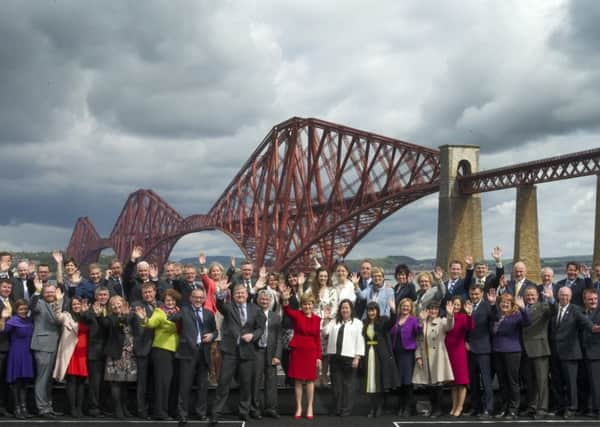Ewan Crawford: Voters will choose, not the party


Working at a senior level for a political party usually means becoming unnaturally obsessed with polling, messaging, “narrative”, slogans and long-winded strategy documents.
But essential as these tools are, often a simple conversation with a voter can prove much more enlightening.
Advertisement
Hide AdAdvertisement
Hide AdBack in the days when suggesting the SNP was on course for 56 MPs would solicit an inquiry into your health, I tried to convince a friend Labour should be removed from office at Holyrood by rehearsing carefully-crafted arguments about why the then First Minister, Jack McConnell, and his party, were basically doing terrible things to the NHS, the criminal justice system and the economy. They had to go. Now.
“Fine,” my friend said. “But how do I know your party’s any better?”
Caught up in a media-political environment where the language is all about landing a blow, drawing blood and winning FMQs, it can become easy to forget that, guess what, voters will generally, and reasonably, only reward parties they believe will make their lives better.
Over the last few weeks, opposition politicians and a raft of political commentators appear to have been addressing an electorate of their own imaginations rather than the one that exists. The imagined audience for this rhetoric is made up of two types of people: sensible voters who share the anger and bemusement of those politicians and commentators at the SNP’s success, and also the poor saps who voted for Nicola Sturgeon and who need to be educated about why they did so.
You may have come across expert commentators telling you that in effect rational decision-making has been suspended in Scotland.
In his valedictory speech this week, the outgoing Scottish Labour leader, Jim Murphy, likened the recent Westminster campaign to opposing “a pseudo-religious rock concert where truth didn’t matter”.
Mr Murphy’s description reminded me of some early texts on media theory I read when I first became a university lecturer which cast consumers of journalism, film and TV as easily indoctrinated dupes rather than thinking human-beings.
The reality seems all-too-simple for the SNP’s principal opponents to accept. Incredible as it may seem to them, a large number of people in Scotland want the SNP in government in Holyrood and an even larger number want the party to have an influence over Westminster.
Advertisement
Hide AdAdvertisement
Hide AdAfter a hard slog of a decade and more, because of what the SNP says and does, many people in Scotland now do believe the party is better for their lives and those of their families than Labour or anyone else.
Instead of professing that voters have taken leave of their senses, Labour in particular should be trying to work out why most people currently don’t view them as a credible party of government.
The all-out war on the idea of fiscal autonomy demonstrates many of the problems afflicting the SNP’s opponents. There is, of course, a legitimate argument to be had over policy, timing and deficit levels if full taxation and social security powers are devolved.
But the apocalyptic language again on display this week from Labour and the Tories demonstrates a heavy-handed rejection of the sense of possibility and optimism that characterises much of the SNP’s appeal. However, it is the descriptions and definitions offered of nationalism in the aftermath of the Westminster election that are most telling.
In political science, the dominant school of thought is the position that nations (yes, that includes you Britain) were imagined or created during the modernising processes of the late 18th and 19th centuries. For the SNP, Scottish nationalism is in its essence about a transfer of political power from Westminster to Scotland, which it is argued, will bring about benefits for people living here.
But many leading figures in Labour refuse even to recognise the legitimacy of arguing that position. Instead a conceptually spurious distinction is drawn between “good” patriotism and “bad” nationalism.
I suspect this distinction is lost on most voters. Paradoxically it places Labour in the position where it believes it has to spend time overtly linking itself to “patriotic” symbols such as the ostentatious wearing of the Scotland football strip, while the SNP talks the language of social justice and economic progress.
Mr Murphy was at it again this week when he repeated the apparently accepted internal line that anti-nationalist, pro-patriotic Labour was squeezed by the (English) nationalism of the Tories and the equally irrational Scottish nationalism of the SNP.
Advertisement
Hide AdAdvertisement
Hide AdThis “anti-nationalist” position seemed to be undermined somewhat when the Blairite candidate for the Labour leadership, Liz Kendall, issued an image yesterday with the slogan: “Country Comes First.”
The difference here is that we are being invited, heroically I would suggest, to believe that the idea that Britain comes first has nothing to do with nationalism (British or otherwise) but a slogan that says “Stronger for Scotland” is nationalist madness.
In fact, it is as legitimate and honourable to argue for the continuation of the British nation state in its current form as it is to campaign for a new independent Scottish nation state. But let’s not pretend one is a morally superior idea to the other.
Far from being immune, as some have it, to the “normal laws of politics”, the SNP will thrive only if it continues to demonstrate to people that their lives will be better with an SNP government.
Similarly, in relation to the constitution, independence, or proper “home rule”, will only come about when a majority believes that will mean a better life for them.
For those of us on the Yes side, this means the need to make greater progress on the economic case is key.
And for those parties seeking a way back from defeat in Holyrood or Westminster it means coming to terms with what is required to get back into government – not questioning the voters’ sense or your opponents’ legitimacy.